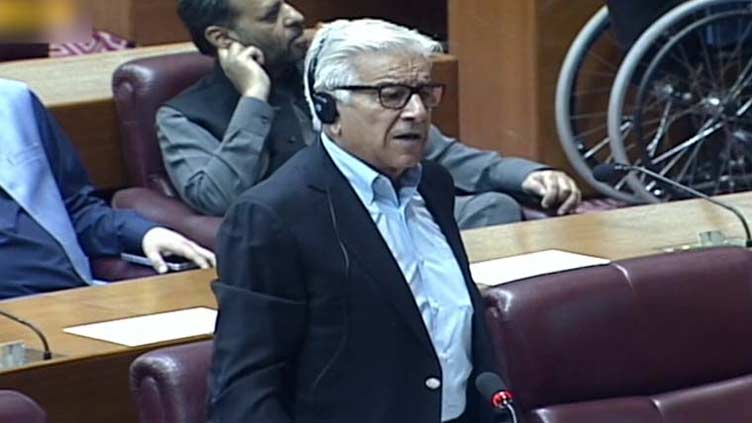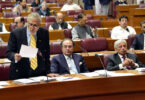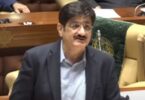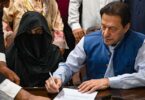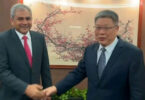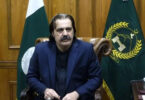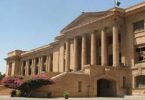F.P. Report
ISLAMABAD : Defence Minister Khawaja Asif on Sunday blasted the PTI, saying they hadn’t changed their May 9 stance, as the opposition members resorting to sloganeering in an attempt to disrupt his speech in the National Assembly.
His remarks came as the treasury benches later in the day managed to table and later got a resolution passed, which called for protecting the minorities while condemning the series of attacks targeting them in different parts of Pakistan.
The opposition is neither with the people nor the country, said the minister who added they were working on protecting their persona interests, not that of the country amid the opposition members chanting slogans [Fata Operation Not Acceptable] against the proposed Operation Azm-i-Istehkam to root out terrorism from erstwhile Federally Administered Tribal Areas (Fata) and other parts of Pakistan.
He said the PTI members – who are currently united under the banner of Sunni Ittehad Council (SIC) in legislatures after being elected independents in February 8 elections – represented the May 9 episode and would do the same in the future too.
Khawaja Asif said the treasury benches wanted to introduce a resolution in the House in favour of minorities who were not safe in Pakistan, but the opposition wasn’t even allowing him to discuss a serious issue.
Mobs and groups were killing people in Swat and Faisalabad, he said, adding that the even smaller Muslim sects remained unsafe even through Islam didn’t committing murders in the name of religion.
The constitution guaranteed the minorities’ right and the state was responsible for protecting them, said the minister in unequivocal terms, as he wondered why the opposition wanted to silence the voice through their protest.
As he started Khawaja Asif started his speech, he said minorities were completely insecure in the same of religion, causing embarrassment to Pakistan internationally.
During his speech, he said the decisions made in the Apex Committee about the planned Operation Azm-i-Istehkam would be put before the federal cabinet besides tabling the matter before the parliament – a plan approved by an Apex Committee meeting held to review the National Action Plan (NAP).
The opposition could share their reservations during the debate, said Khawaja Asif who mentioned that their leader – PTI founding chairman Imran Khan – was also used to change his stance and they were just mimicking him.
Criticising the PTI for its politics, he mentioned that they committed power theft, but resorted to protest when electricity supply was suspended – a reference to the trend in Khyber Pakhtunkhwa where Chief Minister Ali Amin Gandapur has regularly defended the practice while also encouraging the people to take law and order into their hands.
NO TO MILITARY OPERATION
As Deputy Speaker Ghulam Mustafa Shah announced a one-hour break after the defence minister’s speech, the SIC members left the House and said that they were against any military operation.
PTI Chairman Barrister Gohar told reporters outside the Parliament House that no operation could be conducted without taking the House into confidence, adding that absence of opposition represented dictatorship, not democracy.
Asad Qaiser – a former speaker – said they did not support any military operation and the parliament wasn’t being consulted on the subject by bypassing the legislature while taking such a massive decision.
Claiming that none of the military action has proved successful in the past, he said they wanted peace but against committing excesses, while describing it as a “martial law mentality”.
“On one hand, you are launching an operation and, on the other, you are imposing taxes on Fata and Pata [formerly Provincially Administered Tribal Areas],” he argued.
Similarly, Leader of Opposition Omar Ayub said “we cannot push ourself into someone else’s war” and termed the budget as “economic terrorism”.
WHAT’S IS THE OBJECTION?
When the House resumed its proceedings, Law Minister Azam Nazeer Tarar was again interrupted during his speech, as he wondered what objection the opposition wanted to raise. “Please tell what is your objection [over the resolution to be tabled to highlight minorities’ rights].”
The minister said protection of minorities was a national issue and noted that courts should take such matters [attacks on minorities] seriously, stressing the need for identifying the culprits and delivering justice.
He noted that the resolution only mentioned a fact that the federal and provincial governments at their respective levels were responsible for protecting the minorities and there was nothing for the opposition to make a hue and cry by turning it into a political stunt.
Tarar remarked that their prime minister [Shehbaz Sharif] would attend the in-camera briefing unlike that of PTI – Imran Khan – who had backed then refused to attend the session in the presence of the then opposition.
IN-CAMERA BRIEFING
When given an opportunity, Barrister Gohar mentioned that the military leadership in the past had given in-camera briefing on the proposed operation and the government should have brought the matter before the House before making a decision.
He claimed that the parliament had already set the parameters for any operation and their point of order was a matter not just of the Pakhtuns, but also of entire Pakistan. “We want parliament’s supremacy.”
PROTECT THE MINORITIES
After hours-long opposition protest and objections, the law minister was at last able to present the resolution which urged the federal and provincial governments to take every possible step for protecting different minority groups.
In this connection, the document passed by the House also called for punishing those involved in these barbaric acts so that the trend could be arrested.
Courtesy: Dunya News

